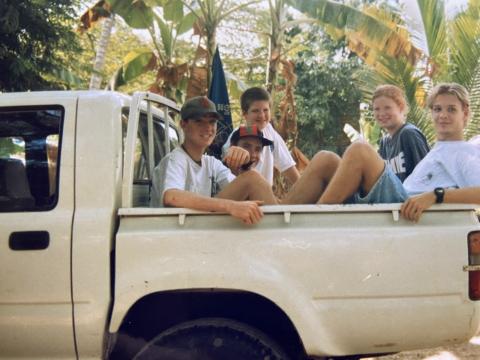
The secret to successful immunisation campaigns? Relationships.
By Andrea Kaufmann
When I was 13, I lived in Cambodia where my parents worked in development at a local faith-based organisation. Because of this, I got to spend a day at a rural clinic outside of Battambang, Cambodia run by the local ministry of health and a faith-based non-profit. We were delivering a batch of vaccines. After a very bumpy ride in the back of a beat up Toyota Land Cruiser to what seemed like an incredibly rural location, I was surprised to learn that this journey was actually pretty straightforward compared to what it took to mobilise community members to join the growing line of families waiting outside the clinic that day.
The community health workers described months of work to ensure communities had accurate information about the vaccines: when they would be available, what they were for, and how they’d promote healthy communities. It took listening, enlisting allies and collaborating with local faith and community leaders to address misinformation and fear. It took modelling behaviours, patience, honesty. And perhaps most importantly, the health workers demonstrated remarkable compassion.
I’ve been thinking about that trip as we prepare to celebrate World Immunisation Week in the midst of global COVID-19 vaccine campaign rollouts. It’s been 25 years since that day, and now I am one of those faith leaders working with community leaders to encourage vaccine uptake. Yet it’s like I’m 13 again. In just a year, we have lost considerable ground in childhood immunisation coverage and progress tackling HIV and AIDS, Tuberculosis, and Malaria, potentially doubling annual death tolls. According to the Gates Foundation, vaccine coverage has declined to levels not seen since the 1990s as a result of the COVID-19 pandemic: “We’ve been set back about 25 years in about 25 weeks.”
With COVID-19 vaccines, while we certainly face challenging technical and logistical realities, we are increasingly convinced that the much more complex part of this rollout journey isn’t the technology or the logistics. As one of my colleagues says: “The challenge is not getting the vaccines to the arms, but getting the arms to the vaccines.” Vaccine hesitancy was cited by World Health Organization as a top 10 global health threat, even before COVID-19.
World Vision is actively working with communities, leveraging survey tools, such as Barrier Analysis, to understand the key barriers to vaccine uptake, which vary greatly from community to community and across disparate contexts. For example:
- in Bangladesh
- all of those surveyed who intended to get a COVID-19 vaccine (‘accepters’) said: “Most of my community leaders and religious leaders would want me to get a COVID-19 vaccine”
- only 38% of those who did not intend to get the vaccine (‘non-accepters’) believed that community and faith leaders would advocate for individuals to take the COVID-19 vaccine
- in East Africa
- accepters in Kenya were 3.8 times more likely, and those in Tanzania 10 times more likely, to say that most of their community and religious leaders would want them to get a COVID-19 vaccine
- non-accepters were 9.7 times more likely than accepters to say that they strongly agreed with the statement: “Whether I get COVID-19 or not is purely a matter of God’s will or chance”.
Yet our work allows us to see the essential role that faith leaders and communities can play in vaccine campaigns. Whether the identified barriers are the perceived lack of access, perceptions about the severity of COVID-19, divine will, or social norms (stated by doctors or faith leaders themselves) – faith leaders can and do play an essential role in addressing these obstacles. They are providing accurate, fact-based information about the pandemic and COVID-19 vaccines, based on WHO and government advice. They are sharing pertinent information about when, where, and how to access available vaccines. They are joining World Vision Channels of Hope workshops that address relevant cultural and faith-related topics, such as perceptions about divine will, ethical concerns about the development of vaccines, and particular interpretations of sacred texts.
Much like the community health workers I was introduced to at 13, faith leaders are listening. They are addressing misinformation and fear. They are modelling behaviour. They are patient. And they are expressing their love for their neighbours daily as they advocate for access, share accurate information, promote vaccine uptake, and walk alongside the world’s most vulnerable.
For more on World Vision's work with faith leaders and communities click here
Andrea Kaufmann is World Vision's Senior Director, External Engagement, Faith and Development.
Main image: A 13-year-old Andrea [back right] and friends in Cambodia.